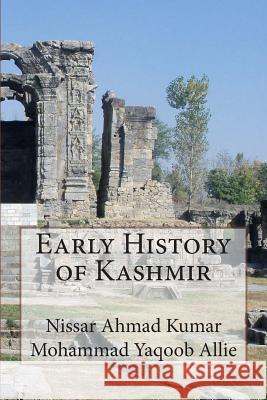Early History of Kashmir » książka
Early History of Kashmir
ISBN-13: 9781507597170 / Angielski / Miękka / 2015 / 276 str.
Kashmir with its hoary past and bewitching beauty, philosophical intellectualism and mystic spiritualism is a paradise on earth. Not only geographically, Kashmir excels in its cultural heritage too. The lovely people of this lovely land have been known for their arts and crafts throughout the world. Walled off by high mountains and endowed with an unequalled natural beauty, Kashmir remained an inviolate with unequalled natural beauty; Kashmir remained an inviolate sanctuary of Indian culture, till at least the fourteenth century. Buddhism, Shivism and Sanskrit learning flourished in valley and produced a remarkably rich culture till the Muslim conquest over turned the social structure of Kashmir. The integration of Kashmir life was so complete that one of his most remarkable books that Ksemendra, who was himself a Shivite, produced was on the avadanas of the Buddha, a classic later Buddhist literature. Despite its geographical isolation, Kashmir has from ancient times, been a melting pot of nations and cultures. Its magnificent woods, enchanting lakes, rivers, meadows, glorious snow-clad mountains and above all fertile valleys attracted the foreigners to come and settle over here. Trade, religion and other cultural currents followed the ancient routes resulting in the migration of nomads of pre historic periods, and later Mauryan, Sakas, Kushanas, Huns, Syyids, Mughals, Sikhs and Dogras found place in Kashmir. The period covered in this book extends from the earliest times to A.D 1339, when the valley passed into the hands of a Muslim adventurer, Shahmir. The book opens with the account about the geographical features of Kashmir, that is followed by the political background of ancient Kashmir and that thoroughly covers the period of the three indigenous and independent dynasties of Kashmir i.e., Karkotas, Utpalas and Loharas respectively. The work has been written with the objective of giving a comprehensive story of Kashmir involving the common mans social, economic and political life during the times gone by. The work is based on the literary, epigraphic and archaeological sources. we tried to make this study of ancient Kashmir through and systematic. We feel immense pleasure in expressing profound gratitude to our esteemed supervisor Professor Susmita Pande, head of the Department, Vikram University Ujjain, for her scholarly help and advices. We wish to express our grateful thanks to Dr. Dhirendra Solanki and Dr. Ram Kumar Ahirwar and Dr. V.S. Parmar for their kind help, guidance, encouragement, untiring supervision and cooperation and their valuable suggestions, which kept us always on the right track with infinite patience.
Zawartość książki może nie spełniać oczekiwań – reklamacje nie obejmują treści, która mogła nie być redakcyjnie ani merytorycznie opracowana.











